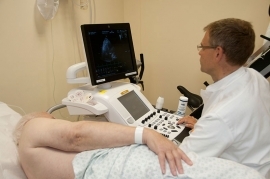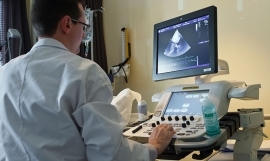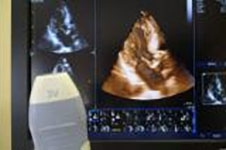Dobutamine stress echocardiography
What is it?
What is it?During a dobutamine stress echocardiography, an echocardiography is performed while dobutamine is administered intravenously. Dobutamine makes the heart beat faster, provoking the effect of physical exertion.
Sometimes, resting echocardiography provides insufficient information about the heart. Certain abnormalities are only visible when the heart is stressed. An echocardiography by dobutamine administration can show whether all parts of the heart are contracting properly and whether there is oxygen deficiency.
Preparation
PreparationYour cardiologist may ask you to stop certain medications that slow heart rate (e.g beta blockers or some calcium antagonists) a certain number of days before the test. Before administering this medication, the physician will check if you are contraindicated for it.
Electrodes are attached to the upper body to record an electrocardiogram. An IV line will be placed in a blood vessel in your arm to administer the dobutamine. In order to automatically measure your blood pressure, a blood pressure meter will be placed on your upper arm. You will take a seat on the examination table and then lie on your left side.
Test
TestGel is applied to your chest and the echo probe is passed over various places on your chest. Dobutamine, and possibly atropine, will be administered intravenously to increase heart rate. This happens very quickly. It is important to tell the physician if symptoms arise during the test. The entire procedure takes approximately 45 minutes.

Risks
Risks
Sometimes, there is a reason to end the test early. The intravenous administration will be stopped if the following signs arise: heart rhythm disturbances, shortness of breath, headache, chills, chest pain or seriously elevated blood pressure. If necessary, an additional medication may be administered in order to make the symptoms disappear.
You will be monitored continuously during the procedure via an electrocardiogram and a blood pressure monitor. These measurements allow for the timely detection of any heart rhythm disturbances. Equipment and medication to treat any potential heart rhythm disturbances are always available.
Due to the atropine, older men may temporary experience difficulty urinating.

Results
ResultsAt the end of the consult, the cardiologist will discuss the findings of the dobutamine stress echocardiography, as well as the possible changes in treatment that may result.
Aftercare
AftercareAfter the test, you may feel somewhat tired. No specific aftercare is required.
Centres and specialist areas
Centres and specialist areas
Latest publication date: 14/01/2024
Supervising author: Dr Provenier Frank



